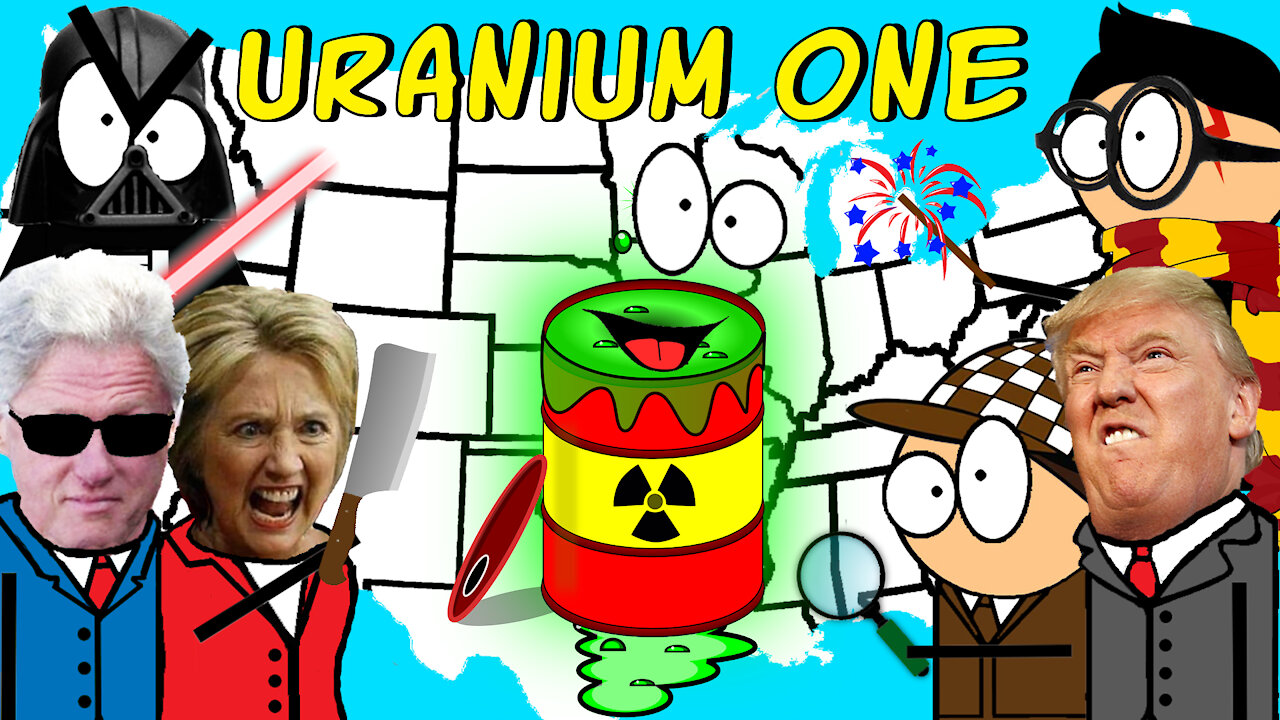Premium Only Content

Uranium One Explained
Originally published on Feb 12, 2019
In Uranium One Explained I explain the Uranium one deal. In the explaining of the uranium one scandal /the uranium one deal I outline with animation how over 145 million dollars went to the Clinton foundation while Russia gradually and casually assumed ownership of 20% of Americans uranium reserves. #uraniumone After the uranium one deal there have been whistle blowers and FBI informants. #uranium1 The uranium one FBI informant testified. l #freedomtoons
The Uranium One controversy refers to the sale of Uranium One to Rosatom, which American conservative media and Republican politicians characterized as a bribery scandal involving Hillary Clinton and the Clinton Foundation. No evidence of wrongdoing has been found after three years of allegations.
Since the 2015 publication of the book Clinton Cash by Breitbart News editor and Steve Bannon collaborator Peter Schweizer, as well as a 2015 New York Times article,[1] allegations of a bribery scheme involving Hillary Clinton, the Clinton Foundation and the 2010 sale of Uranium One have persisted, primarily in conservative media. Despite nearly three years of discussion and analysis of the matter — as well as an FBI investigation[2] — no evidence of any quid pro quo or other wrong-doing has surfaced. Numerous Republican politicians and pundits, including President Donald Trump, have insisted that the Clinton-Uranium One story is the "real" Russian scandal, rather than the matters for which Trump is being investigated.
On April 20, 2007 Uranium One acquired UrAsia Energy, a Canadian firm with headquarters in Vancouver, from Frank Giustra, who then resigned from the UrAsia Energy Board of Directors.[6][7] Having severed ties with UrAsia Energy and Uranium One in 2007, Giustra had no evident beneficial interest in the firm's subsequent sale to Rosatom in 2010. UrAsia has interests in rich uranium operations in Kazakhstan,[8] and UrAsia Energy's acquisition of its Kazakhstan uranium interests from Kazatomprom followed a trip to Almaty in 2005 by Giustra and former U.S. President Bill Clinton where they met with Nursultan Nazarbayev, the leader of Kazakhstan. Giustra denies reporting by The New York Times that he and Clinton traveled together to Almaty.[9] Substantial contributions to the Clinton Foundation by Giustra followed,[6][10] with Clinton, Giustra, and Mexican telecommunications billionaire Carlos Slim in 2007 establishing the Clinton Foundation's Clinton Giustra Sustainable Growth Initiative to combat poverty in the developing world.[11] In addition to his initial pledge of $100 million, Giustra pledged to contribute half of his future earnings from mining to the initiative.[11] There is no indication that Giustra was contemplating any transaction with Russian interests at the time he began donating to the Clinton Foundation in 2005; rather, he sold UrAsia Energy to Uranium One, a Canadian company, in 2007. That sale was completed two months before he made his pledges to the Clinton Foundation.[12]
Since uranium is considered a strategic asset with national security implications and Uranium One owned uranium mining operations in the United States, the acquisition of Uranium One by Rosatom was reviewed by the Committee on Foreign Investment in the United States (CFIUS), a committee of nine government cabinet departments and agencies including the United States Department of State, which was then headed by Hillary Clinton. Clinton herself did not sit on CFIUS, but rather the State Department was represented by Jose Fernandez, the Assistant Secretary of State for Economic, Energy and Business Affairs, who stated that Clinton was not involved in the Uranium One matter.[13][14][15] Although CFIUS members can object to such a foreign transaction, none did,[16] and no member can veto a decision; veto power rests solely with the president.[17][18] CFIUS unanimously approved the Uranium One sale.[19] The Utah Division of Radiation Control and Canada’s foreign investment review agency also approved the transaction.[20][21]
2010
$500,000 payment to Bill Clinton
On June 29, 2010 Renaissance Capital, a Russian investment bank with ties to the Kremlin and which was promoting Uranium One stock, paid Bill Clinton $500,000 for a speech in Moscow shortly after the Rosatom acquisition of Uranium One was announced.
Heartbreaking by Kevin MacLeod is licensed under a Creative Commons Attribution license (https://creativecommons.org/licenses/by/4.0/)
Source: http://incompetech.com/music/royalty-free/index.html?isrc=USUAN1100208
Artist: http://incompetech.com/
Video Game Soldiers by Twin Musicom is licensed under a Creative Commons Attribution license (https://creativecommons.org/licenses/by/4.0/)
Source: http://www.twinmusicom.org/song/295/video-game-soldiers
Artist: http://www.twinmusicom.org
-
 3:48
3:48
Celestialthyme
4 years ago $0.02 earnedSamhain explained
241 -
 3:10
3:10
WideOpenEats
4 years agoBeef Grades Explained (Biteseez)
33.3K -
 15:11
15:11
Patriot Answers
4 years agoMarxism Explained
599 -
 18:56
18:56
TRUTH LOGIC AND COMMON SENSE
4 years ago $0.27 earnedSocial Media Alternatives explained
83912 -
 1:52
1:52
WXYZ
4 years ago'Renter death penalty' explained
1.12K -
 1:28:03
1:28:03
Repent and Believe
4 years agoThe Gospel Explained
117 -
 2:54
2:54
eli1875
4 years ago $0.78 earnedHammer/Scorecard explained
2.42K1 -
 1:21:47
1:21:47
ChaseThePatriot
4 years ago $0.14 earnedElection Chaos Explained
293 -
 LIVE
LIVE
smokenfiretv
7 hours agohappy Saturday
36 watching -
 16:13
16:13
Russell Brand
1 day agoBill Maher EXPOSES Covid Lab Leak Lies LIVE ON AIR
106K344